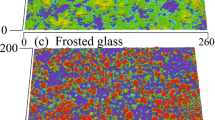Abstract
Now that the specific surface of a powder or granular solid can be quickly measured by the airpermeability method of Lea and Nurse1 or by Rigden's simplification of the method2, it has become possible for the first time to measure the average roughness and angularity, or 'rugosity' as we may call it, of the individual grains.
This is a preview of subscription content, access via your institution
Access options
Subscribe to this journal
Receive 51 print issues and online access
$199.00 per year
only $3.90 per issue
Buy this article
- Purchase on Springer Link
- Instant access to full article PDF
Prices may be subject to local taxes which are calculated during checkout
Similar content being viewed by others
References
Lea, F. M., and Nurse, R. W., J. Soc. Chem. Ind., 58, 277–83 (1939).
Rigden, P. J., J. Soc. Chem. Ind., 62, 1–4 (1943).
Wadell, H., J. Geology, 43, 250–280 (1935).
Rittenhouse, G., Ind. Eng. Chem. (Anal. Ed.), 15, 153 (1943).
Author information
Authors and Affiliations
Rights and permissions
About this article
Cite this article
ROBERTSON, R., EMÖDI, B. Rugosity of Granular Solids. Nature 152, 539–540 (1943). https://doi.org/10.1038/152539a0
Issue Date:
DOI: https://doi.org/10.1038/152539a0
This article is cited by
-
The evaluation of grain shapes in silica sands from a simple flow test
Matériaux et Constructions (1972)
-
Advances in Methods of Studying Clays
Nature (1953)
-
Clay – Water Relationships
Nature (1953)
Comments
By submitting a comment you agree to abide by our Terms and Community Guidelines. If you find something abusive or that does not comply with our terms or guidelines please flag it as inappropriate.



